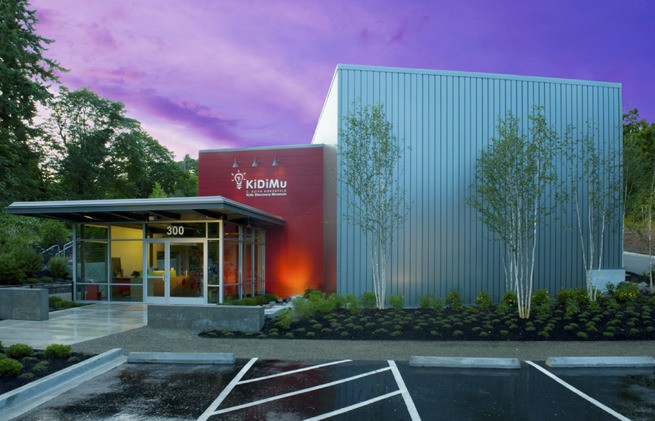The Island Gateway project is raising the bar for green building in Kitsap County.
The Kids Discovery Museum was recently stamped with the green building seal of approval with a LEED (eldership in Energy and Environmental Design) certification, which serves as the benchmark for eco-friendly building. The museum achieved the silver certification, which makes it one of the first buildings in Kitsap County to receive simultaneous interior and exterior ratings.
Eventually all eight projects in the gateway project will be LEED certified, according to Asani’s project manager Craden Henderson, which will make it one of the first complexes in Kitsap County and the state to do so.
“With LEED Silver certification, the building itself becomes a learning opportunity and an example of good stewardship of the environment,” said KiDiMu’s Board President Diane Crowder.
The certification is a national building design standard created by the nonprofit trade organization the U.S. Green Building Council, and was created for better environmental and health performance standards. It rates design, construction and operation of buildings in a host of categories such as new building, core & shell and several others.
The KiDiMu certification is the first of the Island Gateway project, and the other buildings are expected to follow suit as construction finishes. The tenants inside the complex had the option to pursue LEED certification for their building interiors individually.
LEED is a point-based system where building projects earn points for specific building criteria. The number of points determines the level of certification the project receives. A building that is LEED “certified” is the lowest rank followed by silver, gold and platinum as the most prestigious.
With KiDiMu’s silver certification, for both the core and shell and the commercial interior, the museum will add to its curriculum. Krzysztofa McDonough, communications and marketing coordinator. said the museum will add a self-guided “Green LEED Tour” to showcase initiatives such as the building’s “living roof” and compost systems.
Last Saturday, KiDiMu celebrated the double certification by offering $1 off admission price for attendees who walked or biked. That day, 72 percent of museum guests walked or traveled by a “parent-operated vehicle” (stroller), according to McDonough.
KiDiMu’s walkable location from both the ferry and town center; its water and energy saving design; and use of recycled and non-toxic building materials all played a role in the certification, according to Susan Sivitz, the museum’s executive director.
“It is fun for tenants who have an interest in the environment since we’ve basically created a core building that allows them to have a really sustainable interior if they are interested,” said Henderson. “Right now the Bainbridge Art Museum building is slated to receive a gold certification, which speaks to how hard they worked on their sustainability initiatives to use products without harmful chemicals, create efficient lighting, etc.”
Henderson said that although LEED is a wonderful standard for buildings, Asani tries to do more than just comply with criteria. He estimated that 98 percent of everything that came off the Island Gateway site, including some 2,000 tires, was recycled to avoid the landfill. With such close proximity to the ravine near State Route 305, Henderson said it represented a unique challenge.
“We put in some pretty extensive measures to ensure that the water quality entering the ravine is significantly better when it enters the sound,” said Henderson. “Most developers can tell you, they haven’t been able to figure that one out,” said Henderson.
According to the Green Building Council the cost per square foot for buildings seeking LEED certification falls into the existing range of building costs, and that building sale prices for energy efficient buildings are as much as 10 percent higher, per square foot, than conventional buildings. One 2008 study said LEED buildings command rent premiums of $11.33 per square foot over their non-LEED peers and have a 4.1 percent higher occupancy rate.
Many cities across the country encourage green building through their building permit process. Though Bainbridge has an incentive program for residential green building with the Housing Design Development Program (HDDP), it does not yet offer any for commercial development. Chris Wierzbicki said the city doesn’t yet have any plans to develop a green commercial program.
Henderson said the team is energized to see the environmental planning payoff, and is confident that the remaining buildings will see either a gold or silver award.
“We are really proud of the group as a whole for the work that’s been done,” said Henderson.


